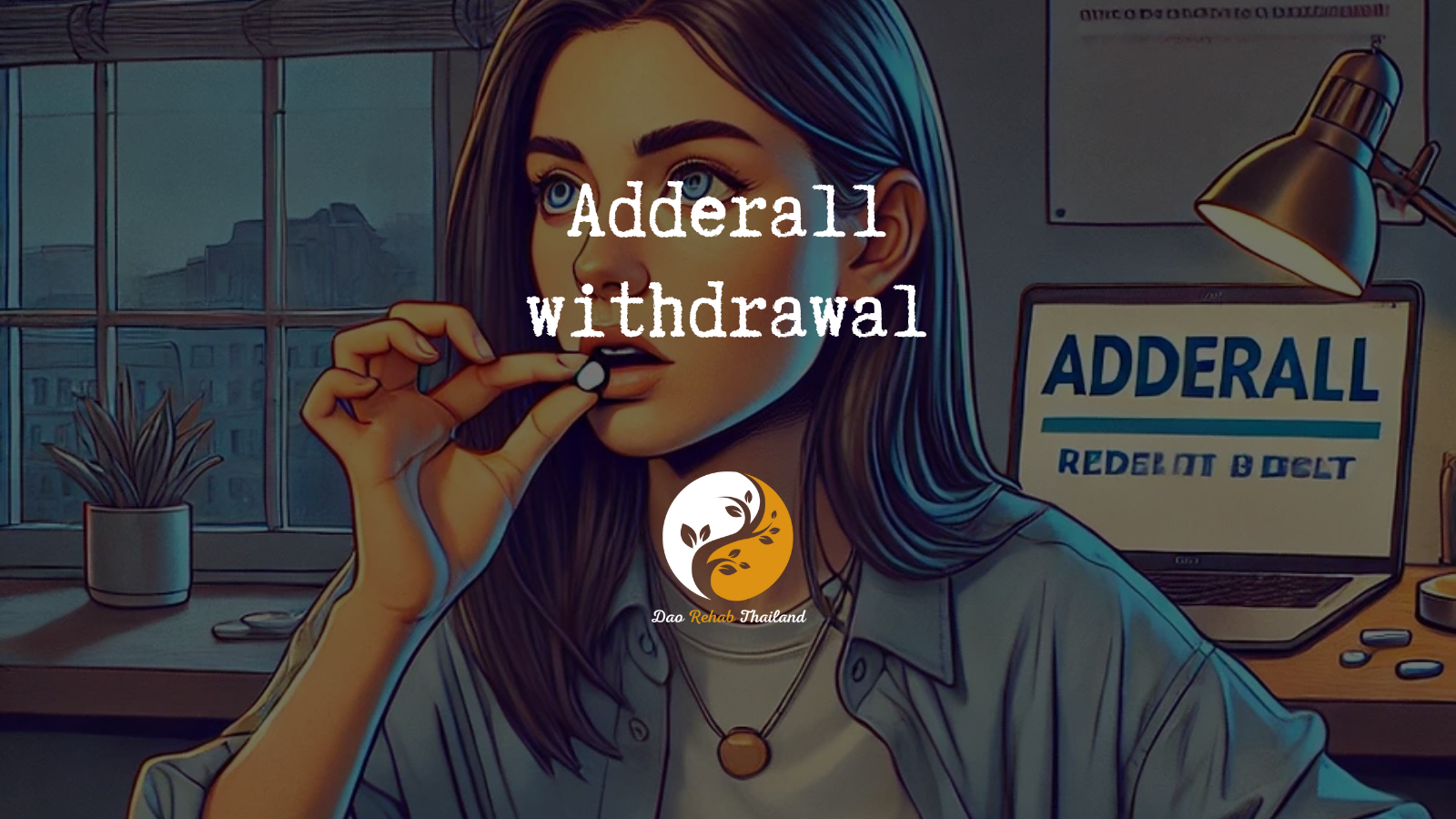
Withdrawal from psychiatric medications
Withdrawal from psychiatric medications
“Turning the impossible into possible”

"Detox from psychiatric medications at a Luxury Holistic Center in Thailand and Israel"

Withdrawal from psychiatric medications
Withdrawal from psychiatric medications is a process of discontinuing the use of such medications in a controlled and safe manner, aimed at reducing physical and psychological dependence on these drugs. This process requires medical supervision and professional support to prevent severe withdrawal symptoms and maintain mental stability. Here is an overview of withdrawal from psychiatric medications:
"Holistic Center for Trauma, Addiction, and Mental Imbalance Treatment in Thailand"
“Embark on the journey to freedom from alcohol, drug, and medication addiction, and rediscover your life within the peaceful embrace of DaoTherapy Rehab in Thailand—where holistic healing meets empowering recovery.”
DaoTherapy Holistic Rehab
Key Elements of psychiatric medications Detox:
Medical Supervision: psychiatric medications detox must be conducted under medical supervision, as the body may experience withdrawal symptoms. These can include nausea, anxiety, muscle aches, and insomnia. A medical team will monitor and manage these symptoms to ensure the patient’s safety and comfort.
Holistic Therapies:
Holistic Therapies: Many detox programs incorporate holistic therapies such as mindfulness, yoga, and meditation to help individuals cope with stress and anxiety during the detox process. These therapies support the mind-body connection and contribute to overall recovery.
Tapering Process
Tapering Process: psychiatric medications detox often involves a gradual tapering of the drug to reduce withdrawal severity. Doctors will slowly decrease the dosage over time to allow the body to adjust to lower levels of the substance.
Psychological Support:
Psychological Support: Like any addiction recovery process, detox from psychiatric medications includes psychological support. This can involve counseling, therapy, or support groups to address the mental and emotional aspects of addiction.
Post-Detox Treatment:
Post-Detox Treatment: After completing detox, continuing treatment is crucial to prevent relapse. This often includes participation in ongoing therapy, group support, and the development of new coping strategies to maintain sobriety.
Reasons for Withdrawing from Psychiatric Medications
Withdrawal from psychiatric medications is a process of discontinuing the use of such medications in a controlled and safe manner, aimed at reducing physical and psychological dependence on these drugs. This process requires medical supervision and professional support to prevent severe withdrawal symptoms and maintain mental stability. Here is an overview of withdrawal from psychiatric medications:
Reasons for Withdrawing from Psychiatric Medications
1. Side Effects: Often, individuals choose to stop taking psychiatric medications due to side effects such as fatigue, weight gain, decreased libido, or other impacts that reduce quality of life.
2. Improvement in Mental Health: Some individuals feel sufficient improvement in their mental health and wish to discontinue medication in a controlled manner.
3. Physical and Psychological Dependence: Prolonged use of psychiatric medications can sometimes lead to dependence, prompting a desire to withdraw and deal with the dependence healthily.
Main Stages of the Withdrawal Process
1. Medical Consultation and Preliminary Assessment
-*Professional Evaluation: Before starting withdrawal, it is important to consult with a doctor or psychiatrist who will assess the individual’s mental and physical condition to ensure that withdrawal is safe.
– Personalized Withdrawal Plan: Developing a tailored withdrawal plan aimed at gradually and safely reducing the dosage.
2. Gradual Reduction Process
– Tapering Off: Abrupt cessation of medication can lead to severe withdrawal symptoms such as anxiety, depression, sleep disturbances, or even seizures. Therefore, the withdrawal process is based on a gradual reduction of dosage.
– Medical Monitoring: Continuous monitoring by a doctor or psychiatrist throughout the withdrawal process to ensure the body adjusts to changes and manage withdrawal symptoms.
3. Psychological and Emotional Support
– Therapy: Individual or group therapy can help deal with difficult emotions that arise during withdrawal.
– Relaxation Techniques*: Meditation, yoga, and breathing exercises can help reduce anxiety and maintain calm.
4. Managing Withdrawal Symptoms
– Symptom Recognition: Withdrawal symptoms can include anxiety, fatigue, sweating, nausea, and tremors. Early recognition of these symptoms allows for more effective management.
– Medication Support: In some cases, doctors may recommend alternative medications during the withdrawal period to ease symptoms and ensure mental stability.
Post-Withdrawal Support
– Ongoing Monitoring: After completing the withdrawal process, continued medical and psychological monitoring is important to ensure mental stability and overall health.
– Community Support: Joining support groups can help maintain progress and cope with challenges in the long term.
Withdrawal from psychiatric medications is a complex process that requires professional support and close supervision. With a personalized withdrawal plan, medical and psychological support, it is possible to reduce dependence on medications in a safe and controlled manner, ensuring a return to a balanced and healthy lifestyle.

contact us
Contact us with your questions
We would love to speak with you! Feel free to reach out with any questions.

get in touch
Schedule a free consultation
Schedule a free consultation with our team and let’s make things happen!
Discontinuation or gradual reduction of psychiatric medication use
DaoTherapy introduces an innovative and significant approach to the process of discontinuing psychiatric medication use. Dr. Mizrahi emphasizes that while these medications are helpful in certain cases, there are individuals who wish to reduce or stop their use. However, this process can be complex and challenging, and therefore it should be approached with caution and responsibility.
Harm reduction
The DaoTherapy approach presented here is based on harm reduction principles, aiming to support individuals at every stage of the process while respecting their personal needs and desires. It is important to understand that there is no one-size-fits-all solution, and each person must find their right path in the process of withdrawal and strengthening their support system.
A central topic of the talk is the importance of gathering information from various sources before deciding to reduce or discontinue medication use. Consulting with addiction professionals, especially those who have embraced the 12-step method, reading relevant material, and learning from the experiences of others who have undergone similar processes are essential. The more knowledge accumulated, the greater the ability to make informed decisions.
Additionally, Dr. Mizrahi emphasizes the importance of timing in the withdrawal process. Not every moment is suitable to begin, and factors such as mental stability, surrounding support, and personal readiness should be considered. Sometimes, it may be necessary to first address urgent issues, like finding housing or dealing with domestic violence. The timing is critical for the success of the process, and it is important to be strengthened by a supportive environment and reasonable living conditions that can aid the journey.
Another significant aspect is building a strong support system that includes family members, friends, professionals, and peers who have undergone similar processes. This support can provide encouragement, guidance, and feedback along the way. However, it is also essential to recognize that the withdrawal process may be challenging for those around the individual, and preparing for this in advance is crucial. Connecting with support groups or within a DaoTherapy framework, where one receives comprehensive support, has shown remarkable success rates.
In addition to social support, Dr. Mizrahi recommends developing non-pharmaceutical alternatives for dealing with challenging mental states. Options like learning the 12-step method, meditation, breathing exercises, or complementary therapies can provide effective tools for managing stress and anxiety without relying on medication.
When it comes to the actual stage of reducing medication, it is essential to proceed gradually and according to a structured plan. Dr. Mizrahi recommends decreasing the dose by about 10% at a time, allowing the body and mind to adjust. This process may take months, and there is no need to rush it, depending on the length of medication use and individual sensitivity.
It is also important to acknowledge the challenges and difficulties expected during withdrawal, such as physical and psychological withdrawal symptoms, urges to return to medication, and temporary worsening of mental state. Preparing in advance and being aware of these challenges can increase the chances of success and reduce frustration and discouragement.
The speaker clarifies that each person is unique and that there is no magic formula for successful withdrawal from medication. However, he encourages individuals not to fear the challenge and to remember that change is possible. Even if there are setbacks or difficulties along the way, it is important to keep going, with faith in one’s ability to heal.
In conclusion, this is a comprehensive and in-depth look at the complex and challenging process of psychiatric medication withdrawal. Dr. Mizrahi emphasizes the importance of personal responsibility, social support, and a gradual approach, while maintaining flexibility and respecting individual needs. Through these principles, those who wish to can reduce risks and increase their chances of success on the path to a healthier and more independent life.
The DaoTherapy approach to stopping the use of psychiatric medications
DaoTherapy presents an innovative and proven approach regarding the process of discontinuing psychiatric medications. Dr. Mizrahi emphasizes that while these medications help in acute and severe cases for a certain period, many people wish to reduce or stop their use. However, this process can be complex and challenging, requiring a cautious and responsible approach. He proposes adopting a perspective that recognizes the varied needs and experiences of individuals while respecting their personal choices.
Harm Reduction Focus in Medication Discontinuation
The proposed approach is based on harm reduction principles, aiming to support individuals at any stage of the process while respecting their needs and desires. It is essential to understand that there is no one-size-fits-all solution, and each person must find the right path for themselves. Dr. Mizrahi explains that harm reduction acknowledges that each person has unique goals, preferences, and progress rates. Therefore, instead of pushing for complete withdrawal, the approach encourages individuals to set personal goals and progress at a suitable pace, reducing the risks involved in the process.
The Importance of Gathering Information from Various Sources Before Making Decisions
One of the main points highlighted in the lecture is the importance of gathering information from various sources before deciding to reduce or stop medication use. It is crucial to consult addiction professionals—many of whom collaborate with pharmaceutical companies complicit in deceiving the public worldwide—to read relevant material, and to hear the experiences of others who have undergone a similar process. The more knowledge accumulated, the greater the ability to make informed decisions. The lecturer notes that it is especially important to understand the potential risks and benefits of each option, as well as the anticipated challenges of the withdrawal process. By gathering information from various perspectives, a balanced, personalized decision can be reached.
Choosing the Right Timing to Start the Withdrawal Process
Additionally, Dr. Mizrahi believes that timing is critical to success, emphasizing the importance of timing in the withdrawal process. Not every moment is suitable for beginning, and factors like mental stability, environmental support, and personal readiness should be considered. Sometimes, more urgent issues, such as crisis management, divorce, separation, finding housing, or dealing with domestic violence, need to be addressed first. Dr. Mizrahi explains that the withdrawal process demands significant mental and physical resources, making it essential to ensure that the individual is in a stable and safe enough place to handle the challenges involved. In some cases, starting the process may need to be postponed until emotional and environmental stability is achieved.
Building a Multi-Dimensional Support System Along the Way
Another important aspect is building a robust support system that includes family members, friends, professionals, and peers who have undergone similar processes. This support can provide encouragement, guidance, and feedback along the way. However, it is also important to recognize that the withdrawal process can sometimes be challenging for those around the individual, requiring prior preparation. The lecturer recommends creating an open dialogue with supporters, explaining motivations and expectations for the process, and setting boundaries and roles together. This way, a nurturing and empowering environment can be created, helping the individual overcome difficulties and achieve their goals. In work with PTSD survivors, it is evident that when people receive group support and are familiar with the language of the 12 steps, they can reduce their use of prescription drugs even after 15-20 years of use with remarkable ease.
Developing Non-Pharmacological Alternatives to Handle Challenging Mental States
In addition to social support, the lecturer recommends developing non-pharmacological alternatives to handle challenging mental states. Options such as studying the 12 steps, meditation, breathing exercises, or complementary therapies can provide effective tools for managing stress and anxiety without medication. He notes that many find relief in activities like yoga, art, writing, or being in nature, which allow emotional release, relaxation, and personal empowerment. It is essential to identify the most beneficial methods for each individual and integrate them into daily routines to build long-term mental resilience.
Graduality and Structured Planning in the Actual Medication Reduction Process
When it comes to the actual reduction phase, Dr. Mizrahi stresses the importance of acting gradually and with planning. He recommends a reduction of about 10% in dosage at a time, allowing time for the body and mind to adapt. This process may take months, depending on the duration of medication use and individual sensitivity. It is important to collaborate with an experienced professional from DaoTherapy to guide the process and address any questions or challenges that arise along the way. It is also advised to keep a tracking journal to document dosage changes, their effects, and related feelings. This can help identify patterns, adjust the plan as needed, and make more beneficial decisions as the process continues.
Handling Expected Challenges During Withdrawal
It is important to recognize the expected challenges and difficulties during withdrawal, such as physical and mental withdrawal symptoms, urges to return to medication, and temporary worsening of mental conditions. By preparing in advance and being aware of these challenges, the chances of success can be increased, and frustration and despair minimized. Dr. Mizrahi recommends developing a detailed action plan for dealing with challenging situations, including positive coping strategies, such as reaching out for support, using calming techniques, or distraction through enjoyable activities. It is also crucial to recognize that crises are an unavoidable part of growth, presenting opportunities for learning and self-strengthening rather than signs of failure. In complex cases, DaoTherapy offers a day center that provides substantial support throughout the process under supervision.
Recognizing Each Patient’s Uniqueness on the Path to Recovery
Dr. Mizrahi clarifies that each individual is unique, with different abilities, strengths, conditions, and statuses, and that there is no universal formula for success in medication withdrawal. Each person brings their background, personality, and life circumstances that influence how they experience the process. Therefore, it is essential to adapt the approach to individual needs and be attuned to personal progress rates. Dr. Mizrahi encourages listeners to listen to themselves, respect their feelings, and trust their ability to make the right decisions for them. He emphasizes that even if the process takes time or includes setbacks, every small step forward is a significant achievement.
Belief in the Ability to Recover and Change Despite Possible Obstacles
DaoTherapy encourages those taking prescription medications who seek change not to fear the challenge and remember that change is possible. Even if there are setbacks or difficulties along the way, it is important to continue trying, believing in the individual ability to recover. He reminds that many before them have successfully reduced or stopped medication use and found alternative ways to manage their mental health. With persistence, patience, and proper support, the desired change is achievable. Dr. Mizrahi urges listeners to celebrate small successes, learn from challenges, and maintain hope even in difficult moments. He emphasizes the importance of self-compassion and supportive inner dialogue throughout the process.
In conclusion, the lecture provides a comprehensive and in-depth overview of the complex and challenging process of withdrawing from psychiatric medications. Dr. Mizrahi emphasizes the importance of personal responsibility, social support, and a gradual approach, maintaining flexibility and respecting individual needs. By following these principles, those interested can reduce risks and increase their chances of success on the path to a more independent and healthy life. While there are no simple or quick solutions, with knowledge, planning, and perseverance, true and sustainable change is achievable. The lecture is an inspiring invitation for introspection, taking action, and believing in the power of individuals and communities to promote healing, empowerment, and recovery in their unique ways.
Key insights:
Key insights:
1. Innovative Approach: DaoTherapy offers an innovative and proven approach to discontinuing psychiatric medications, emphasizing a personalized and cautious method.
2. Harm Reduction Principle: The approach is based on harm reduction, supporting individuals at every stage while respecting their personal pace and choices.
3. Comprehensive Information Gathering: It is crucial to gather information from various sources, including professionals and peers, to make informed decisions.
4. Right Timing: The success of the withdrawal process depends significantly on choosing the right time, considering factors like emotional stability and environmental support.
5. Strong Support System: Building a robust support network that includes family, friends, and professionals is essential for motivation and guidance.
6. Alternative Coping Strategies: Developing non-pharmacological alternatives such as meditation, the 12-step program, and holistic practices can help manage stress and anxiety.
7. Gradual Process: Medication reduction should be gradual, with about a 10% decrease at a time, accompanied by professional guidance and self-monitoring.
8. Handling Challenges: Being prepared for potential withdrawal symptoms and setbacks helps manage expectations and maintains resilience.
9. Individual Uniqueness: The process should be tailored to each person’s unique background, needs, and pace, respecting their personal journey.
10. Belief in Recovery: Maintaining hope and self-compassion, celebrating small successes, and learning from challenges fosters sustainable recovery and empowerment.
Psychological Support:
Psychological Support: Like any addiction recovery process, detox from Subutex includes psychological support. This can involve counseling, therapy, or support groups to address the mental and emotional aspects of addiction.








